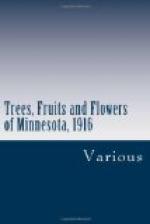Bees that were queenless late in the fall or bees that had an old queen who stopped laying very early in the season, will have only few and old bees for wintering and will not have vitality enough to survive. Such colonies should be united with some other good colony or if too far gone they should be destroyed. Weak colonies should be united until they are strong enough to occupy and fill when clustered at least six frames.
The best stores to winter bees on is pure honey capped over. Honey dew will kill the bees in winter. If you have any black honey in your hives you had better remove it and replace with white honey. A ten frame hive ready for winter ought to contain from 35 to 40 pounds of honey. A complete hive if put on a scale should weigh not less than from 50 to 60 pounds. The best way to supply food to the bees is to remove the dry combs and insert next to the cluster full combs of honey. Feeding sugar is a dangerous undertaking, and it should not be resorted to unless necessity compels one to do it, and then feeding should be done early in the season to allow the bees to invert the sugar, cap it over and consume such stores which are not capped over before winter. The hives that winter best are those which contain no uncapped honey in the frames.
For the bulk of beekeepers cellar wintering in Minnesota is to be recommended. The things to be looked after in cellar wintering are: first, that the temperature of the cellar does not go much below 45 degrees, at least not for any length of time. Second, that the entrances are kept open and clear of dead bees and are guarded with four to the inch wire screen against mice. Third, that the moisture generated by the bees does not accumulate on the walls and covers of the hives. This is most essential. Moisture absorbing material should be used in place of a wooden cover, for instance flax board or gunnysacks, or a super filled with shavings over a queen excluder. The bees must have free passage over the top of the frames. We wintered the bees at University Farm without loss by using nothing else but the one inch flax board on top of the hive, which kept the hive positively dry all winter.
Your cellar should be dark, should have some ventilation, and the bees should never be disturbed during their winter sleep. By following these recommendations, you will be delighted to find your bees in the spring in a most flourishing condition for next summer’s work.
GARDEN HELPS
Conducted by Minnesota Garden Flower Society
Edited by MRS. E. W. GOULD, 2644 Humboldt Avenue So.
Minneapolis.
After the frosts have killed the dahlia foliage the tubers should be dug and stored before the cold becomes so great. They may be injured by it.




